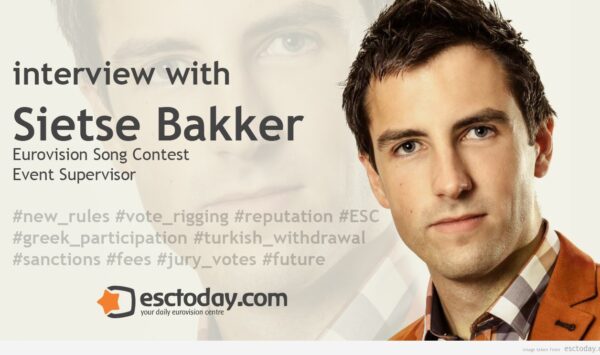Lately the Eurovision Song Contest management have been standing in the eye of the storm. Allegations of vote buying and rigging, tampered jury results, countries withdrawing and the contest experiencing the most severe crisis in its history.
We managed to have a conversation with Sietse Bakker, the contest’s Event Supervisor, and we got the chance to get answers to all the current burning issues around the Eurovision Song Contest. We asked Mr. Bakker about the allegations of the rigged tele-vote and jury vote, for human rights, ERT (Greek broadcaster) shutdown as well as the future plans of the contest.
Today we publish the first part of the exlusive interview with Sietse Bakker.
Human rights / demographics
Clearly, gay and straight people all over Europe enjoy the contest. But given its undoubted popularity amongst gay fans, how can the EBU ensure that visitors are safe in future winning countries, where LGBT rights may be in question?
Ensuring the safety of Eurovision Song Contest visitors is first and foremost the responsibility of the Host Broadcaster, in close cooperation with the relevant authorities. Every year, we ask for a security guarantee from the authorities. This is regardless of sexual orientation. If the safety of our gay friends is particularly at risk, we will decide how to deal with it depending on the local circumstances. No country is the same!
Is there a danger of a dichotomy in Eurovision between viewership demographics? What data does the EBU have on the differences in viewership between Eastern and Western participating countries? And how does the EBU plan to ensure that the show remains relevant for an ever-growing, and ever-diversifying audience?
The Eurovision Song Contest plays different roles in different countries. We have detailed ratings from nearly all participating countries, but these numbers are just one of the many indicators we have to assess the state of the contest. As long as we keep a good balance between celebrating the legacy cherished by those who were part of it and be innovative to appeal to a young audience, I’m sure there is a bright future ahead for the contest.
Greek Broadcaster
ERT, the Greek broadcaster was shut down by the Greek government and was replaced by a new interim channel, DT. Will the new Greek national broadcaster be applying for brand new membership of the EBU, or will ERT’s former membership be carried over in some way? Could the EBU outline this process?
The situation in Greece is complicated. As you know, the EBU has been very active in supporting public service broadcasting in Greece during this difficult time, and will continue to do so. What we do know, from the perspective of the Eurovision Song Contest, is that we are eager to see Greece represented in 2014, and that we keep all options open due to the extraordinary nature of the situation.
2013 changes / future plans
The EBU has just introduced new changes in the jury voting system, by making public the names of the jurors as well as publishing the split votes after the final in May. What led the EBU to take this decision and implement this plan of action?
The decision was taken by the Reference Group, in close dialogue with our team at the EBU, which does a lot of the ground work. The essence behind it is openness. We have seen a lot of speculation after the 2013 contest, where we would instead like to see confidence in the process. By being so open, we make judges accountable for their ranking and give those who are interested the opportunity to see exactly how we came to a valid result
In retrospect, are there still any concerns about the host country’s allocation of running order places, which was debuted in 2013? What was the feedback about this from participating stations after the event?
We have not received a single complaint about the running order from anyone. The Heads of Delegation are TV professionals who understand that you can make a much better show like this.
How much extra capacity does the event have for debut countries over the coming years? Is there a limit to the EBU’s vision for ESC, or can the contest continue to grow and embrace more and more participating nations?
The current format is built on a maximum of 45 represented countries. Obviously, the idea of having all countries in the European Broadcasting Area (the EBU’s territory) represented is quite powerful. But at the same time we have to deal with a reality in which public broadcasters are struggling. To keep the family together obviously has priority over getting new countries on board, but everyone is welcome!
Stay tuned at esctoday.com for the second part of the interview to be published by the end of the week!




